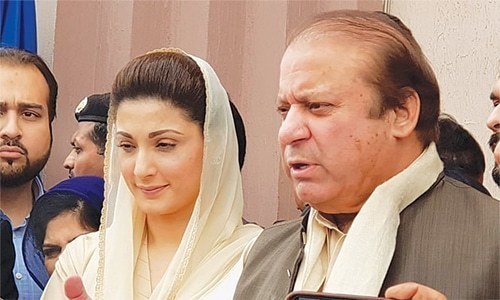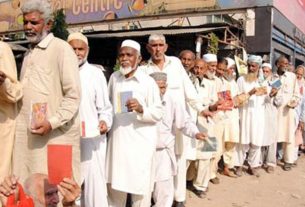The Supreme Court on Monday upheld an Islamabad High Court (IHC) verdict that had ordered the suspension of prison sentences awarded to former prime minister Nawaz Sharif and his daughter Maryam Nawaz in the Avenfield corruption reference.
A five-member bench, headed by Chief Justice of Pakistan Mian Saqib Nisar, dismissed National Accountability Bureau’s (NAB) plea against the high court’s decision.
The apex court, in its ruling, said that NAB has failed to provide the “ground for cancellation of bail” and that the IHC had not exceeded its authority in granting bail to the convicts of the Avenfield reference.
Read: Avenfield House or ‘tax haven’ house?
The Supreme Court’s decision brings a rare relief for the Sharif family, both of whose leaders — Nawaz Sharif and Shahbaz Sharif — are currently incarcerated.
Maryam thanked “Allah Almighty for today’s decision” but said that her “true relief and happiness would be when my father comes back home.”
At the outset of the hearing today, the chief justice told NAB prosecutor Akram Qureshi to “convince [the bench] why the high court’s ruling should be suspended”.
The chief justice told the NAB counsel to delineate the grounds on which the apex court can suspend the granting of bail. “Also tell us if the high court had the authority to suspend the sentence,” he added.
Qureshi explained that his argument stood on the basis of earlier cases heard by the top court, claiming that bail can only be granted in the case of “hardship”, which was not the reason behind IHC’s verdict.
The NAB prosecutor pointed out that the IHC had questioned the merit of the trial in its judgement — something he said a high court cannot do in a bail plea.
Take a look: IHC surprised at ‘lapse’ by NAB in Avenfield case
“Nawaz Sharif was granted bail on the same grounds that had led to his conviction,” observed Justice Gulzar Ahmed, who was also part of the bench. “You did not challenge those grounds.”
Justice Asif Saeed Khosa, who is set to succeed Justice Nisar as the top judge, said that NAB’s argument was not “solid” and rejected the claim that the high court had exceeded its authority.
He further said that the high court had mentioned that its “observation was not final”.
The chief justice, however, told the NAB prosecutor that “an interim order is never final and [it] never affects the final verdict either.”
In July 2018, an accountability court had handed Sharif 10 years as jail time for owning assets beyond known income and 1 year for not cooperating with NAB.
His daughter Maryam was given seven years for abetment after she was found “instrumental in concealment of the properties of her father” and one year for non-cooperation with the bureau. Meanwhile, Nawaz’s son-in-law retired Captain Safdar has been given one year jail time — for not cooperating with NAB, and aiding and abeting Nawaz and Maryam.
In Sept 2018, the IHC had accepted the convicts’ petitions and suspended the trio’s respective prison sentences — a decision that the corruption watchdog had subsequently challenged in the apex court.




